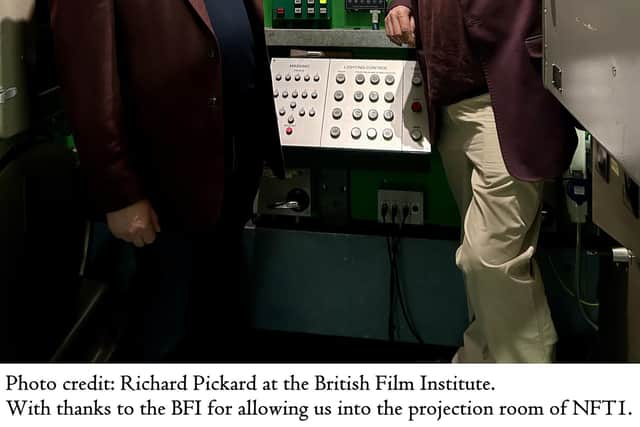Doctor Who and Back to the Future: Leeds-born Spitting Image voice artist's new book on time travel
Growing up in Harehills, the children’s television shows of the 1960s were often about time travel. Doctor Who - whose 60th anniversary is now being marked with special episodes - was chief among them but there was also The Time Tunnel and, later, The Tomorrow People.
As Steve remembers it, people could “almost watch a time travel show every night,” he says.
Advertisement
Hide AdAdvertisement
Hide Ad“I lived in Leeds, Harehills, and it was a terraced house, and you could walk straight from the pavement into the living room. We had a little porch area, a little square box in the corner, and for a kid obsessed with the TARDIS this was brilliant because I could be in the living room and I could open the little porch, I could spin around that and open the door and then I was in another world. And that's how I used to play.”


Steve, now 62, has been enamoured with such an idea since he can remember and with Dick Fiddy, a British Film Institute archive television programmer, has written Destination Time Travel.
The book, using examples such as Doctor Who but also films like Back to the Future, The Terminator and Netflix hit Dark, explores the tropes, rules, plots, characters and, most importantly, the enduring appeal of stories which use the concept of time travel.
The first instalment of the family sci-fi Back to the Future film trilogy, from 1985, is an important example and “in Hollywood it is pretty much regarded as the perfect screenplay,” says Steve, of High Barnet, north London. In the film, high school student Marty McFly goes back 30 years using his scientist friend Doc Brown’s DeLorean, which can disappear to another age using its ‘flux capacitor’ device when the car hits 88mph.
Advertisement
Hide AdAdvertisement
Hide AdHowever, Steve doesn’t believe the film’s writers, Robert Zemeckis and Bob Gale, get the credit they deserve. When he talks in schools, and brings the subject up, their relative anonymity shows.


“I said: ‘Who wrote A Christmas Carol? Hands went up. Charles Dickens. I said: ‘Who wrote Back to the Future?’ They just looked at me with blank faces.”
He told them it was “‘one of the great pieces of screenwriting that there has been, and if something similar came out tomorrow, it would probably make billions because there's so many poor movies now that aren't family oriented’.
"We desperately need a family blockbuster, I think, there hasn't been such a thing for years that you can take the six year old to see it, and granny, and watch again and again. But they didn’t know who it was. And I said: ‘Well, here's the problem in the movies, you never know who wrote them’. So we've tried in the book as well to, for once, credit all the writers as best we can.”
Advertisement
Hide AdAdvertisement
Hide AdSteve had a realisation when it came to writing his own debut novel, The Time That Never Was, which was published last year.
He says: “I realised when I was writing that, I had to work out what my own time travel rules were. And that's how the (new) book came about because I then thought, well, let's see how other people have done it. Let's see how The Terminator did it. He's got to arrive naked and that's fine because it puts him in jeopardy straight away.
“In the DeLorean, you don't have to arrive naked but you do have to travel at 88 miles per hour. So every time tale has its own rules.”
He started to put some notes together and, adds Steve, his publisher said: “‘Well, this is a book and it will probably sell more copies than your novel will’.”
Advertisement
Hide AdAdvertisement
Hide AdIt was back in 1976 that Steve started as a performer in the working men's club circuit around Yorkshire. After gaining a degree in Drama and English at the University of Birmingham in 1983, he joined the repertory theatre company at Theatr Clwyd. From 1984 he provided the voices of many Spitting Image characters – including the Queen Mother, Mrs Thatcher and Alan Bennett and over the years he has worked as an actor, comedy performer, voice artist, lecturer, writer and broadcaster.
It came after a difficult childhood. His mother died of a brain hemorrhage when he was nine, and his father had schizophrenia.
Eventually Steve and his sister went to live with their maternal grandparents Mary and Jack Oddy, and he joined their team of paper boys delivering the Yorkshire Evening Post. Incidentally, he says that if he did have a time machine, he would want to meet grandfathers as young men just before or after the war.
On occasion as a youngster he’d visit his great-aunt Marjorie’s for a bath – a memory which has become its own sort of time travel.
Advertisement
Hide AdAdvertisement
Hide Ad“I was going through a difficult time and so I'd hold on to the taps in her bathroom, and I talked to myself in the future, or rather my future self would talk to me and say: ‘Steven, everything's okay’.”
Ten years on, he returned when she died.
“The first thing I did was go up to the bathroom. I hadn’t been there for many years, and I held on to the taps and I became the future self I'd spoken to. It’s a bit weird but I remember saying aloud: ‘Everything's going to be okay. Steven’. And that's the other thing about time travel – it's not it's not just the paradoxes and the intellectual conceits and the ideas. There's a real emotional power.”
Destination Time Travel, published by Luath Press, is out now.